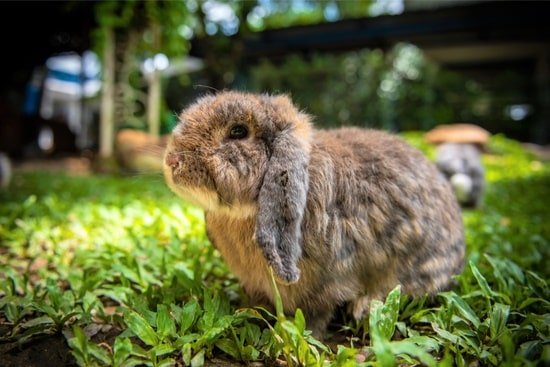Pets are part of our family, so we humanize them. That’s why we worry that an animal will share the same anxieties as a child. It’s natural to be concerned about rabbits being left alone in the dark, for example. These tiny and frail animals may be frightened when left alone.
Darkness by itself doesn’t scare a rabbit. They cannot see in pitch blackness, but their eyes are accustomed to dim lighting. What will concern a rabbit in the dark are strange noises and scents. If a rabbit smells or hears something they cannot see, it will spook them.
Rabbits need a contrast of light and darkness every day to moderate their body clock. Create a sleeping area that replicates a wild warren. This is a dark environment that your rabbit feels safe within. They can then enjoy natural light for the rest of the day.
Are Rabbits Nocturnal?
It’s a common misconception that rabbits are nocturnal animals. Unlike many small pets, bunnies are crepuscular. This means that they are most active at dawn and dusk.
The average house rabbit will wake up at dawn, often long before their human owners. Your rabbit will be active at this point, so you must ensure they have sufficient room to exercise in their hutch. They’ll also need toys and other entertainment.
A rabbit will then doze off again around mid-morning, and stay asleep until early evening. When they arise – usually hungry – they’ll be at their most energetic and playful.
As you can imagine, this means that your rabbit will likely still be active after you retire to bed. They’ll sleep at night eventually, but there will be a period of crossover.
If you return your rabbit to their hutch at night, you’ll need to ensure that they’re comfortable. This means more entertainment, but also that they feel safe.
We have to remember that rabbits are prey animals. While grazing at dawn and dusk, wild bunnies can see predators coming in the low sun. A domesticated rabbit, locked in a hutch and unable to see properly, lacks this ability.
Can Rabbits See in the Dark?
A rabbit’s night vision is vastly superior to that of a human. They also have a 360-degree field of vision. The only blind spot in a bunny’s eyesight is something directly below their chin. This is because their eyes are on the side of their head.
Despite this, rabbits cannot see in pitch blackness. As they are crepuscular, their vision is strongest in dim lighting. Rabbits can make their way around in gloomier conditions than humans. They still need some light, though.
In darker conditions, rabbits rely more on their other senses. A wild rabbit will use their sensitive whiskers to judge distance in a warren. This is how they know if they are deep enough underground to be safe.
Rabbits also have excellent hearing, and a keen sense of smell. They rely upon these senses, alongside their natural instincts, to stay safe at night.
If your rabbit is allowed to free roam the house while you’re asleep at night, provide some illumination. This should be a dim lamp though, not a bright overhead light. If a rabbit spends too much time in artificial light, then their body grows confused.
Do Rabbits Need Dark to Sleep?
As rabbits doze from mid-morning until early evening, they do not necessarily need darkness to sleep. A rabbit will judge their sleep schedule by their energy levels. If they’re exhausted, they’ll flop down and fall asleep.
Despite this, it’s crucial that rabbits enjoy a balance of darkness and light. Bunnies don’t keep diaries, so this is how they understand the time of year. They molt and grow fur accordingly, staying warm in winter and cool in summer.

Besides, even domesticated rabbits are driven by instinct. In the wild, a bunny will crawl into a dark warren to sleep. Pet rabbits desire the same opportunity.
Regardless of whether your rabbit sleeps indoors or outside, provide them with a separate bedroom area. Placing a cardboard box in their hutch will do the trick. Stuff this box with hay, and your pet will feel safe and secure.
If your rabbit doesn’t sleep in their hutch at night, you should still provide this dark area. Rabbits are light sleepers, and will be disturbed by any change in illumination. Clear out a drawer for them to sleep in, or place a box on the floor. Here’s how to tell if your rabbit is asleep.
Should I Cover My Rabbit’s Hutch at Night?
It’s advisable to cover your rabbit’s hutch at night. There are several reasons for this:
- Protection from Other Animals. Wild predators roam outside at night, and other pets wander indoors. If you have a cat, remember that felines patrol the house at night. They’ll frighten a bunny or worse.
- Capping Curiosity. Rabbits are inquisitive by nature. If something is happening outside their hutch, they’ll want to investigate. By covering their hutch, they’ll snooze through activity and get a good night’s rest.
- A Guaranteed Light/Dark Schedule. If your rabbit sleeps outdoors, they’ll theoretically have a natural day and night cycle. Light pollution in cities can confuse a rabbit, though.
Covering the hutch of an outdoor rabbit provides additional protection from the weather. Harsh winds, pouring rain and thunder, and lightning can all be dangerous to bunnies.
You can cover their hutch with tarpaulin, or even just a soft blanket. The most important thing is that you remember to remove the cover in the morning.
Here are some of the most common reasons why your rabbit won’t sleep in its hutch at night.
Do House Rabbits Need a Night Light?
Rabbits are not afraid of the dark in and of itself. If they cannot see and things are happening around them, though, they’ll naturally become skittish.
- An outdoor bunny will smell and hear wild animals. These could be foxes patrolling your yard, neighborhood cats, or owls and bats. Your rabbit will be aware that these animals are around, but unable to see them.
- An indoor bunny will hear humans moving around the house. If you get up late at night to use the bathroom, for example. They will recognize your scent, but it can still be jarring.
A night light may help with this, but should be approached with caution. You’re sending a message to your rabbit that darkness is something to fear. That will make an already-anxious animal even more nervous.
Also, rabbits are chewers. If you leave a live wire in their hutch, they’ll chomp through it and hurt themselves. Any exposed wiring must be covered up.
If your rabbit takes comfort from a night light, make it as dim as possible. Don’t point the light directly at your rabbit. Better yet, leave it outside their hutch.
Remember, a rabbit doesn’t need a direct light source to see. Any kind of dim and distant penetration through gloom is sufficient for them. Anything brighter and you place them at risk.
Do Rabbits Need Natural Light?
Natural light is essential to a rabbit as it’s how their body judges the time of year. This, in turn, impacts upon a rabbit’s molting and reproductive cycles.
It’s more important than a rabbit enjoys natural light to aid their coat. Bunnies naturally grow thick, warm fur toward the end of fall. This means they’ll be protected during a cold winter. Some rabbits even change color at this time.
This fur will become hot and uncomfortable during the summer. This is why rabbits molt heavily in the spring. When the hot months arrive, they’ll have a limited amount of fur.
A rabbit’s reproductive cycle, meanwhile, lasts between March and September. This is because baby bunnies are born without fur. If they were to arrive in winter, they would be unable to survive the elements.
Of course, rabbits cannot tell time. Halloween and Memorial Day could be side by side, as far as your rabbit is concerned. This is why their bodies react to the level of light they receive. It gives a rabbit an indication of the time of year.
How Many Hours of Light Do Rabbits Need?
If a rabbit is kept in captivity, they should experience the same level of light as their wild counterparts. This can easily be achieved with outdoor rabbits. Those that live inside must be handled with care.
If your rabbit is indoors all day, they won’t be able to detect natural light patterns. Even if their hutch is by a window, their bodies can grow confused. They cannot tell the difference between natural light and artificial illumination.

In terms of how many hours of light a rabbit needs, think in terms of their hours of activity. Your rabbit tends to wake up at daybreak, and stay active until mid-morning. They then rise again in the early evening.
This suggests that, in summer, a rabbit needs around 8 hours of light. This can be reduced to around 5 in the winter, as the sun rises later and sets earlier.
Try to get your rabbit outside as much as you can during this time. It doesn’t just provide them with exercise; it also aids their natural body clock. Don’t overdo it, though. Rabbits need a contrast of light and darkness.
A rabbit that lives in constant light can experience stress. In addition, their eyes can be damaged, and they’ll gain weight. Provide a dark area for your bunny to sleep and relax within.
Do Domestic Rabbits Need Sunlight?
It has been made increasingly apparent by scientists that rabbits need sunlight to flourish. If it’s too cold and wet to play outside, invest in a UV light for rabbits.
As the University of Illinois explains, rabbits need sunlight to absorb critical Vitamin D. Vitamin D deficiency leads to a lack of calcium in your pet’s body. This, in turn, leads to weak and brittle bones, and potential dental issues.
Please be aware that when we say direct sunlight, we mean just that. Simply placing your rabbit’s hutch by a window is insufficient. The glass in the window will block the Vitamin D from reaching your pet.
If you decide to use a UV light, take the appropriate safety precautions:
- Keep the lamp away from your rabbit’s preferred sleeping spot. They need the variation of light and dark.
- Shine the lamp as close to your rabbit as is safe and comfortable. UV rays do not travel far.
- Hide and secure any trailing wires. Your rabbit can and will track these down, and chew through them.
- Pick up a lamp with appropriate power. UV lamps will have a percentage on the packaging, usually 2%, 6% or 12%. The higher this percentage, the more powerful the lamp – though naturally, none will match the sun.
- Review your lamp regularly, and change the bulb as soon as early as possible. UV lamps burn brightly, and briefly. If the bulb burns out or explodes, it could become dangerous.
Only invest in a high-quality lamp stocked by a reputable pet store. UV rays are not something to take lightly. A cheap lamp that does not filter UV appropriately can be a cancer risk.
Do Rabbits Like to Lay in the Sun?
Rabbits understand how good UV rays feel, so they’ll enjoy basking in the sun. It’s rare for an energetic bunny to lie down and sunbathe. They may fall asleep in the sun after a busy playtime.
Be aware that, as with all pets, this needs to be managed. If your rabbit is asleep, they won’t notice that they’re too hot.
Rabbits become distressed when they overheat. When your bunny has had enough sun, scoop them up and return them to their hutch. They may wake up and protest, but it’s for their own good.
Short, regular exposure to the sun’s rays is the safest approach for rabbits. Try to avoid letting your pet become a sun-worshipper. This will leave them at risk of dehydration and skin cancer.
Rabbits are not afraid of the dark. They are afraid of what could lurk in the dark, though. This is quite understandable. Rabbits struggle to defend themselves in broad daylight. Not being able to see a predator just makes things worse.
This can be tempered by providing your rabbit with a safe, dark place to doze within. The closer you can imitate a bunny’s natural habitat, the better. This encourages your pet into a natural light/dark cycle, and keeps them healthy.


Thank you for this article. It was very informative and I learned a lot. I’m getting a new bunny after living without a rabbits for 2-3 years and I can’t wait for my bundle of joy to come home. I’ll take everything I learned from this article to be the best rabbit parent I can.
This is a great article, this have given me so much information.
Thank u.